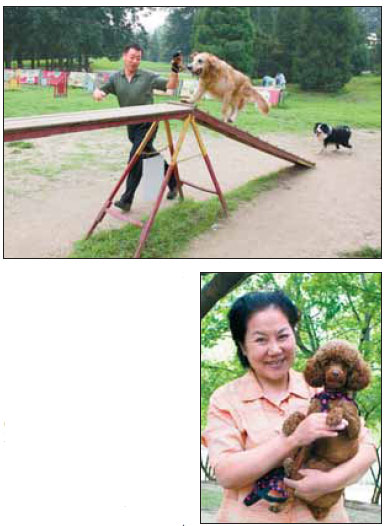Who let the dogs out?
 |
|
From top: Pet owners can train their dogs at Coolbaby Dog Park in Beijing. Chen Xingzhi and her pet have a get-together with other dog keepers twice a week. |
While China's top-tier cities may not yet be equipped with enough dog parks, some upstart restaurants and hotels are beginning to realize the potential for profit in being dog-friendly.
Pudi Hotel is one of a few hotels in Shanghai that advertises its pet-friendliness. Pudi not only allows pets to venture indoors, but also offers rooms specifically targeted at pet owners, the hotel's sales executive Luo Jiaping says.
Luo says the increasing prevalence of dog ownership in China convinces the hotel to provide accommodations for dog owners. Pudi charges about 345 yuan ($54) per pet, with a limit of two pets in each room.
"Guests love their pets and are willing to pay the rate," she says. "Sometimes they request that we serve their pets the same way we treat a human being."
Hotels in Beijing aren't leaving dog owners in the dust either. Aloft Beijing has been operating since 2008 and is one of the only dog-friendly hotel chains in the country.
"I think more people are treating their pets like a part of their family," Aloft Beijing's managing director Zhang Lei says. "Our company did surveys that revealed many guests want to bring their pets along with them when they travel."
In addition to their Beijing site, Aloft runs 11 other locations across China, all of which are dog-friendly.
Restaurants are also warming up to the pet-friendly trend. The owners of Beijing's Bylace Cupcakes says their policy on pets is flexible.
"We let people with pets in all of our shops. Our only rule is that the animal be kept under control and away from the counter and food for sanitation purposes," Bylace co-owner He Yong says.
"We understand the inconveniences that dog owners go through."
Zhang Xiaoqiu, an animal rights activist with the China Small Animal Protection Association, says China is on the right trajectory.
He thinks the appearance of dog-friendly restaurants, parks and hotels is a promising sign, but that it's still too early to say China is a welcoming place for dogs.
Education, Zhang says, is the key to creating a dog-friendlier China.
"Dogs should always be leashed when entering public places," Zhang says. "Many people don't spay or neuter their dogs, so sometimes they can be more aggressive."
Peng, of ICVS, also stresses that dog owners ought to strongly consider having their pets sterilized.
"Culturally, in China spaying and neutering an animal is considered strange and almost cruel," she says.
She says unsterilized dogs contribute to the growth of stray animal populations and rabies outbreaks.
Like Zhang, Peng says education is key to improving conditions for dogs.
"You have to understand where the country is in its development," Peng says.
"We're only one generation into companion animal ownership. It takes time for education to seep in."
Still, she remains optimistic about prospects for dogs and dog owners in China's cities.
"We're on the same trajectory as any other developing country in the world," she says. "People really love their pets here."
Contact the writers at ericjou@chinadaily.com.cn.
Mary Katherine Smith in Shanghai and Gao Meng in Beijing contributed to the story.














